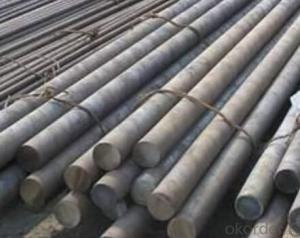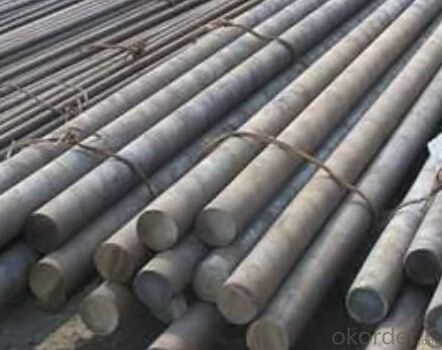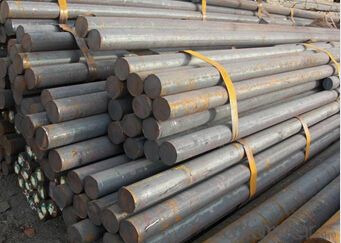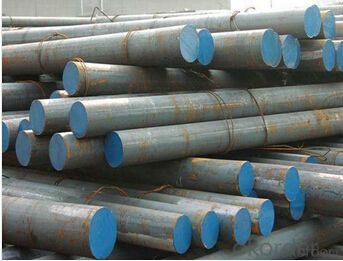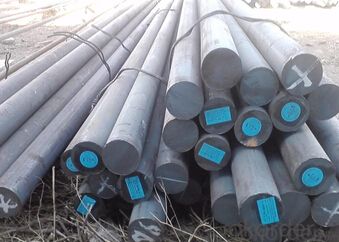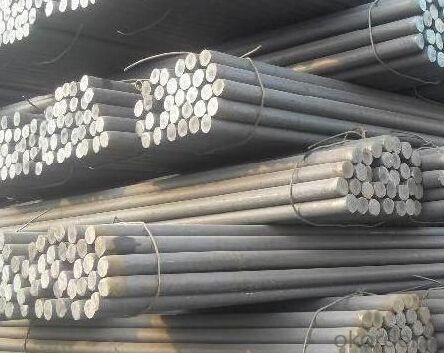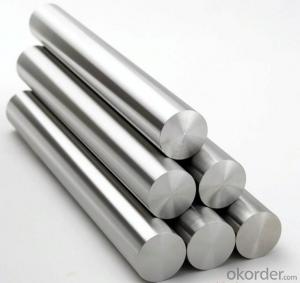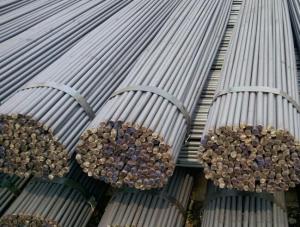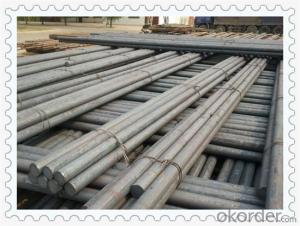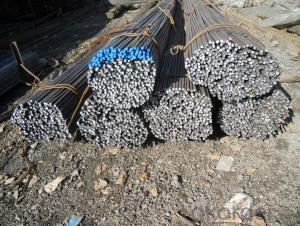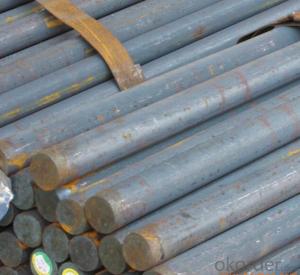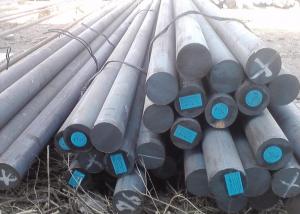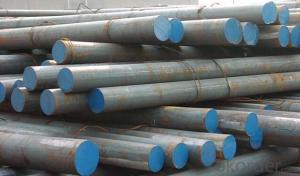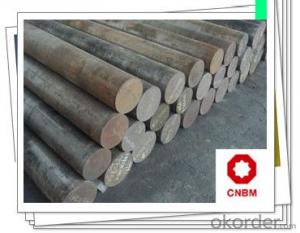American Standard Round Bar with Grade: ASTM A36; AISI 1006-1025
- Loading Port:
- Tianjin
- Payment Terms:
- TT OR LC
- Min Order Qty:
- 100 m.t.
- Supply Capability:
- 5000 m.t./month
OKorder Service Pledge
OKorder Financial Service
You Might Also Like
Product Description:
OKorder is offering American Standard Round Bar with Grade: ASTM A36; AISI 1006-1025 at great prices with worldwide shipping. Our supplier is a world-class manufacturer of steel, with our products utilized the world over. OKorder annually supplies products to European, North American and Asian markets. We provide quotations within 24 hours of receiving an inquiry and guarantee competitive prices.
Product Applications:
American Standard Round Bar with Grade: ASTM A36; AISI 1006-1025 are ideal for structural applications and are widely used in the construction of buildings and bridges, and the manufacturing, petrochemical, and transportation industries.
Product Advantages:
OKorder's American Standard Round Bar with Grade: ASTM A36; AISI 1006-1025 are durable, strong, and resist corrosion.
Main Product Features:
· Premium quality
· Prompt delivery & seaworthy packing (30 days after receiving deposit)
· Corrosion resistance
· Can be recycled and reused
· Mill test certification
· Professional Service
· Competitive pricing
Specifications of American Standard Round Bar with Grade: ASTM A36; AISI 1006-1025
1. Grade: ASTM A36; AISI 1006-1025
2. Sizes: Diameter: 6mm-150mm; Length: 6m, 9m, 12m or as customer’s request
3. Tolerance: Within ±5% for weight; ±2mm for diameter
4. Type: Mild steel; Low carbon steel
5. Shape: Round bar, solid bar of steel with circular section
6. Technique: Hot rolled or cold drawn
7. Mass: Mass (kg/m) = Diameter (mm) × Diameter (mm) × 0.00617
Usage and Applications of American Standard Round Bar with Grade: ASTM A36; AISI 1006-1025
1. American standard is the most common form of steel as its price is relatively low while it provides material properties that are acceptable for many applications. American standard round bar is often used where large amounts of steel need to be formed, for example as structural steel.
2. And we can use this kind of product on the performance of the mechanical parts if the demand is not very high.
3. Steel round bar is used in construction and a large number of architectural and engineering structures.
4. Some special round bar can be used for automotive engine and transmission components, bearing, rails machine tools and wire rope.
Packaging & Delivery of American Standard Round Bar with Grade: ASTM A36; AISI 1006-1025
Packaging Detail: All goods are packed in bundle with steel strips and shipped by break bulk vessel or container (depend on target market and different ports)
Delivery Detail: 45 days
Trade terms: FOB, CFR, CIF
MOQ: 25 tons per specification; we can negotiate the quantity if the specification is normal or we have stock of one specification.
Weight: The price invoicing on theoretical weight basis or actual weight basis depends on customer’s request.
Shipment: The shipment of bulk break or container is depends on customer’s request and the situation of the port of destination.
Documents given: Full set of original clean on board bill of lading; Original signed commercial invoice; Original packing list; Policy of insurance; Certificate of origin and what the target market needs.
Production Flow of American Standard Round Bar with Grade: ASTM A36; AISI 1006-1025
The common processes are preheated forging quenching, dual refinement solution process, cooling quenching and isothermal quenching. We use heat treatment for dual refinement solution process.
Quality Assurance of American Standard Round Bar with Grade: ASTM A36; AISI 1006-1025
1. We will strictly inspect our production that we sold according to the customer’s request.
2. Quality should be in conformity with the specification of the manufacturer. Quantity and packing conditions should be in conformity with the term in the contract.
3. Should the packing found damaged, the buyer has the right to claim to the seller.
FAQ:
Q1: Why buy Materials & Equipment from OKorder.com?
A1: All products offered byOKorder.com are carefully selected from China's most reliable manufacturing enterprises. Through its ISO certifications, OKorder.com adheres to the highest standards and a commitment to supply chain safety and customer satisfaction.
Q2: How do we guarantee the quality of our products?
A2: We have established an advanced quality management system which conducts strict quality tests at every step, from raw materials to the final product. At the same time, we provide extensive follow-up service assurances as required.
Q3: How soon can we receive the product after purchase?
A3: Within three days of placing an order, we will begin production. The specific shipping date is dependent upon international and government factors, but is typically 7 to 10 workdays.
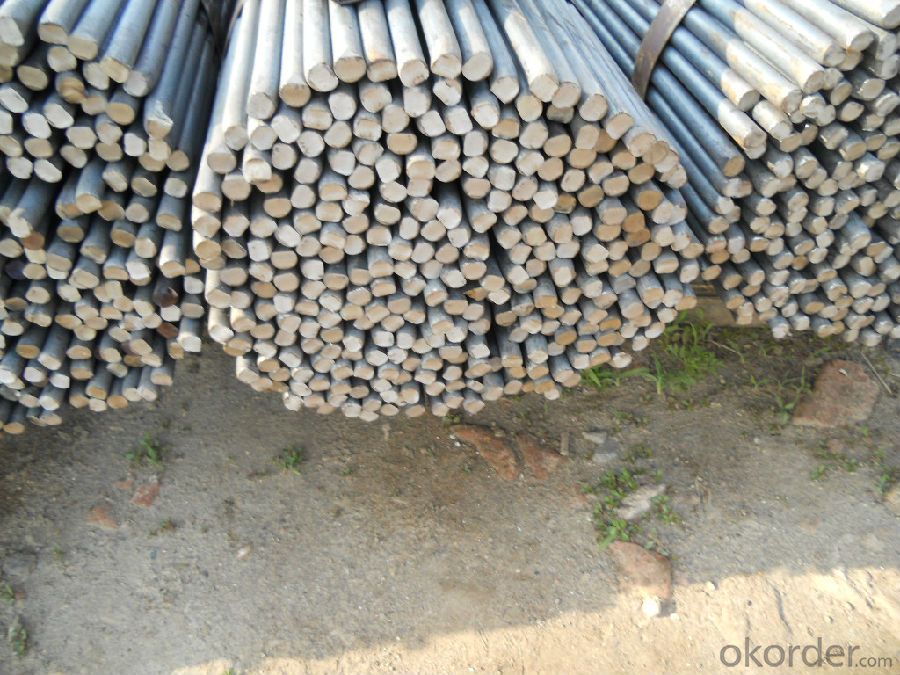
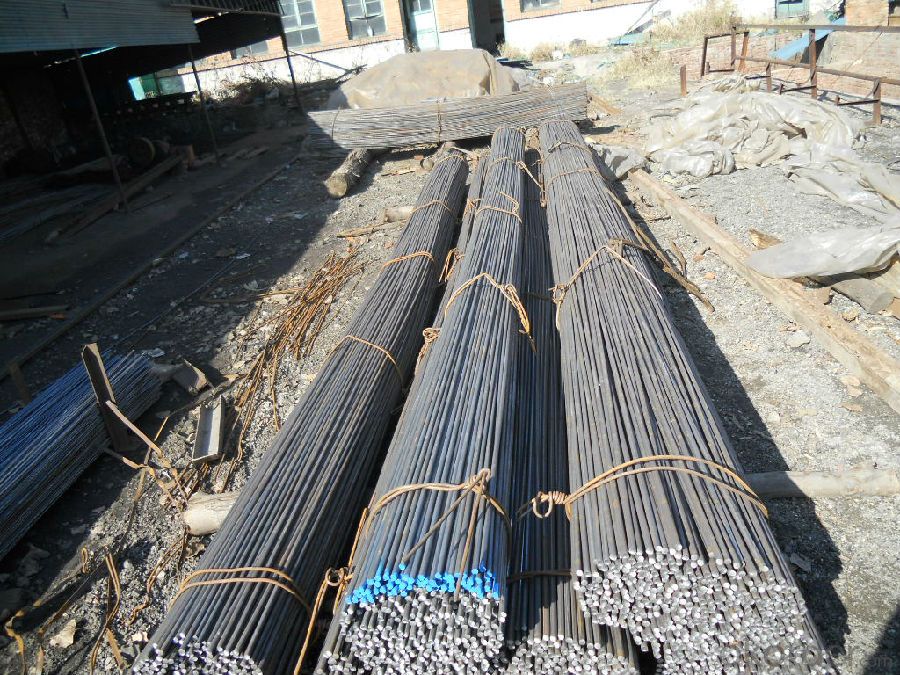
- Q: What are the different types of steel round bar alloys for improved hardness and strength?
- Improved hardness and strength are characteristics associated with various types of steel round bar alloys. Some commonly used alloys renowned for these qualities include: 1. Carbon Steel: Exceptional strength and hardness make carbon steel a popular choice. Its higher carbon content enhances durability and resistance to wear and tear. 2. Alloy Steel: Combining carbon steel with elements like manganese, nickel, chromium, or vanadium results in alloy steel. These additions enhance hardness and strength, making it suitable for applications requiring high tensile strength and toughness. 3. Stainless Steel: With a minimum chromium content of 10.5%, stainless steel is a corrosion-resistant alloy. Chromium's addition improves hardness and strength, making it ideal for applications demanding resistance to corrosion, heat, and wear. 4. Tool Steel: Tool steel is tailor-made for manufacturing various tools. It boasts high hardness, wear resistance, and strength. Elements like tungsten, molybdenum, or vanadium are often added to enhance its performance. 5. High-Speed Steel: Developed specifically for high-speed cutting tools like drills and milling cutters, high-speed steel excels in hardness and retains its cutting edge even at high temperatures. 6. Maraging Steel: Maraging steel, a low-carbon, high-nickel alloy, stands out for its exceptional strength, toughness, and resistance to fatigue. It finds applications in industries like aerospace and defense that demand high strength and durability. These examples merely scratch the surface of the steel round bar alloys known for improved hardness and strength. The choice of alloy depends on the intended application and desired properties for the final product.
- Q: What are the scientific names of round bar and screw steel?
- Steel: steel is commonly known as hot rolled ribbed bar. Ordinary hot rolled steel bars are made up of HRB and the minimum yield point of the brand.
- Q: How do steel round bars differ from other types of steel bars?
- Steel round bars possess different characteristics compared to other types of steel bars, primarily in their shape and versatility. Unlike square or flat bars, steel round bars have a cylindrical shape and a circular cross-section, which grants them greater adaptability and flexibility. One of the main benefits of steel round bars lies in their capability to endure high levels of stress and pressure. Their circular shape ensures a uniform distribution of weight and pressure, making them ideal for applications that demand durability and strength. Consequently, these bars find wide usage in construction, manufacturing, and engineering projects that prioritize structural integrity. Another noteworthy distinction is the ease of machining and manipulation that steel round bars provide. Their cylindrical shape facilitates effortless drilling, cutting, and shaping, rendering them highly versatile and suitable for a vast range of applications. They can be conveniently welded, bent, or formed into diverse shapes, granting them an edge over other steel bar variations in terms of customization. In terms of appearance, steel round bars possess a distinctive visual allure. The sleek and cylindrical surface of these bars grants them a polished and refined appearance, making them aesthetically pleasing in architectural and decorative applications. In conclusion, steel round bars stand apart from other steel bar types due to their shape, versatility, and strength. Their ability to endure high levels of stress, ease of machining, and appealing aesthetics make them a favored choice in numerous industries.
- Q: Can steel round bars be bent or formed into different shapes?
- Yes, steel round bars can be bent or formed into different shapes through various processes such as hot or cold bending, machining, or using specialized equipment like a pipe bender or a press brake.
- Q: Can steel round bars be coated or painted?
- Steel round bars have the capability to undergo coating or painting. The purpose of coating or painting steel round bars is manifold; it prevents corrosion, enhances aesthetics, and provides additional protection against environmental factors. There are several methods available for applying coatings and paints to steel round bars, including powder coating, electroplating, or wet paint application. These processes involve first preparing the surface of the steel round bar by removing any existing rust or contaminants, and then applying the chosen coating or paint. The selection of the appropriate coating or paint depends on the specific requirements of the steel round bars, such as their intended use, environmental conditions, and desired appearance. By coating or painting steel round bars, their lifespan can be significantly extended, their visual appeal can be improved, and their durability can be ensured in a wide range of applications.
- Q: How do steel round bars compare to plastic round bars?
- Steel round bars are generally stronger and more durable compared to plastic round bars. Steel has a higher tensile strength and can withstand heavier loads, making it suitable for applications that require high-strength materials. On the other hand, plastic round bars are lighter and more flexible, making them more suitable for certain applications where weight and flexibility are important factors.
- Q: What are the safety precautions when handling steel round bars?
- To minimize the chance of accidents or injuries, it is important to adhere to several safety precautions when dealing with steel round bars. 1. Personal Protective Equipment (PPE) should always be worn. Safety goggles, gloves, steel-toed boots, and a hard hat are essential in safeguarding against potential hazards like flying debris, sharp edges, and heavy objects. 2. Proper lifting and carrying techniques are crucial. Due to the weight and bulkiness of steel round bars, it is vital to employ correct lifting methods to prevent strain or injury. Lift with your legs, maintain a straight back, and avoid twisting or jerking movements. If the bars are too heavy, seek assistance or employ mechanical aids like forklifts or cranes. 3. Ensure secure storage and stacking. Properly securing and organizing steel round bars when storing or stacking them is imperative. Use appropriate storage racks or A-frames to prevent tipping or falling, which could result in severe injuries. When stacking multiple bars, employ spacers or shims to maintain stability. 4. Be cautious of sharp edges. Steel round bars might possess sharp edges or burrs, necessitating care when handling. Wearing gloves is advised to protect your hands, and avoid dragging or sliding the bars to prevent cuts or abrasions. 5. Employ proper handling techniques. Maintain a firm grip when moving steel round bars and be aware of your surroundings. Do not swing or throw the bars, as they may strike someone or cause damage. Instead, walk slowly and steadily, ensuring clear pathways and ample space for maneuvering. 6. Inspect for defects. Prior to using steel round bars, examine them for any defects or damage that could compromise their structural integrity. Look for cracks, dents, or deformities. If any issues are detected, refrain from using the bars and report them to a supervisor or quality control personnel. 7. Observe fire safety measures. Steel round bars are highly flammable when exposed to extreme heat or sparks. Hence, avoid working near open flames or hot work areas. Keep fire extinguishers nearby and ensure that everyone is trained in fire safety protocols. By adhering to these safety precautions, the risks associated with handling steel round bars can be significantly minimized, creating a safer work environment.
- Q: How are steel round bars used in the automotive industry?
- Steel round bars are commonly used in the automotive industry for a variety of applications due to their strength, durability, and versatility. One of the main uses of steel round bars in the automotive industry is for the production of crankshafts. Crankshafts play a crucial role in converting the reciprocating motion of the pistons into rotational motion, powering the vehicle. Steel round bars are ideal for this application as they offer high tensile strength, excellent fatigue resistance, and the ability to withstand high torque loads. Steel round bars are also used in the manufacturing of axles. Axles are responsible for transferring power from the engine to the wheels, supporting the weight of the vehicle, and providing stability. Steel round bars provide the necessary strength and rigidity required to handle the heavy loads and forces experienced by the axles. Additionally, steel round bars are utilized in the production of suspension components such as tie rods and sway bars. Tie rods are crucial for steering and maintaining proper alignment, while sway bars help to control body roll and improve handling. Steel round bars are preferred for these applications because they offer excellent torsional strength, allowing them to withstand the forces and stresses encountered during steering and suspension movements. Furthermore, steel round bars find use in the production of transmission shafts. Transmission shafts are responsible for transmitting power from the engine to the wheels via the gearbox. Steel round bars are well-suited for this application due to their high strength, resistance to bending, and ability to handle the rotational forces and torque generated by the engine. In summary, steel round bars are widely used in the automotive industry for various applications such as crankshafts, axles, suspension components, and transmission shafts. Their superior strength, durability, and versatility make them an ideal choice for these critical components, ensuring the safety, performance, and reliability of vehicles.
- Q: Can steel round bars be used for making fasteners or bolts?
- Certainly! The utilization of steel round bars is viable for the production of fasteners and bolts. Steel is widely employed as a material for these components due to its exceptional robustness, longevity, and resistance against corrosion. The round bars, crafted from steel, can be effortlessly manipulated and threaded, enabling the creation of an array of fasteners and bolts such as screws, nuts, and threaded rods. The selection of the precise steel grade hinges upon the specific application and desired strength properties. Nevertheless, it is imperative to bear in mind that the manufacturing process and stringent quality control are paramount in guaranteeing the dependability and performance of the end product.
- Q: Can steel round bars be used in the production of flanges?
- Yes, steel round bars can be used in the production of flanges. Steel round bars are commonly used as raw materials for manufacturing flanges due to their high strength, durability, and ability to withstand high pressure and temperature requirements in various industrial applications.
Send your message to us
American Standard Round Bar with Grade: ASTM A36; AISI 1006-1025
- Loading Port:
- Tianjin
- Payment Terms:
- TT OR LC
- Min Order Qty:
- 100 m.t.
- Supply Capability:
- 5000 m.t./month
OKorder Service Pledge
OKorder Financial Service
Similar products
Hot products
Hot Searches
Related keywords
